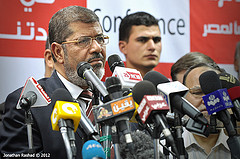Egypt's President loosens grip but doesn't let go of power grab


After a sweeping assertion of power last Thursday caused tensions to rise, Egyptian President Mohamed Morsi said in a statement Monday that while his edict stands, the authority it grants him is not as absolute as originally implied. Issued last week, the controversial decree made the President immune to judicial oversight, expanding his executive authority and giving him broad power over the courts. It resulted in several days of protest in the country, criticism from the judiciary, and violent clashes between supporters and opponents reminiscent of demonstrations during the overthrow of former dictator Hosni Mubarak in 2011. An emergency meeting called in Cairo Monday between Morsi and Egypt's Supreme Judicial Council aimed to resolve disputes, diffuse crisis, and restore peace.
Whether it served to do so remains to be seen. The result was a compromise the President's office describes as clarification rather than reversal--or even amendment--of his decree. After the meeting, spokesman Yassir Ali issued a statement assuring the public the broad power given to Morsi under the decree only applied to "sovereignty-related issues." He said the President had, "the utmost respect for the judicial authority and its members" and this was a temporary measure meant only to last through parliamentary elections and the establishment of a new constitution.
Again, it's unclear whether this will suffice to quell fears in the country as Morsi says the text of the Presidential decree remains in place. Those protesting it on the grounds that it leaves Morsi's power too unchecked likely will continue to do so, and comments from some of Egypt's top judges indicate they view the situation as unresolved as well. Shortly after the statement was released judicial council member Abdelrahman Bahloul said it was, "frail and does not represent the members of the council."
[via NBC, Washington Post, LA Times, Wall Street Journal]
Related on SmartPlanet:
- Iran offers aid to post-Sandy New York
- Africa's largest social network looks to expand
- Energy subsidy-blackout link in Egypt
This post was originally published on Smartplanet.com